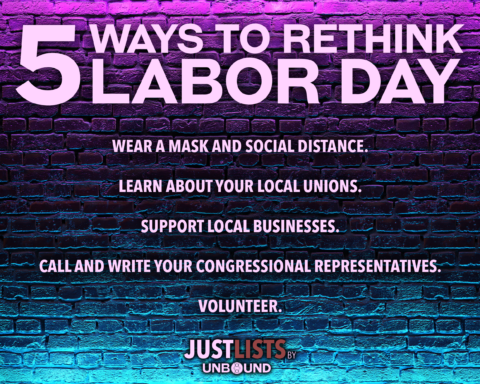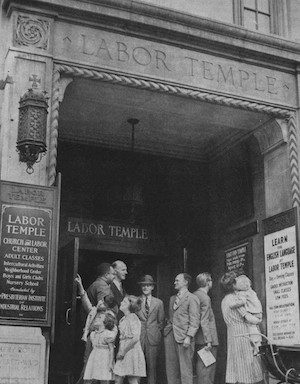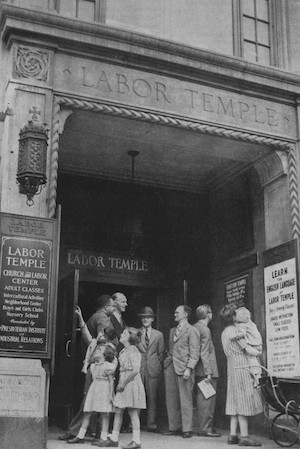A Labor Day Sermon for 2018.

PC: Ilana Urman
On Labor Day, those who celebrate may rightly commemorate a long struggle of worker vs employer. The struggle continues as a fight for truth—against the myths that would turn economic theory into an ideology. In an earlier generation, that ideology was called the Gospel of Wealth.
I find economics fascinating, and have great respect for my former professors at the University of Chicago. And yet, as I listen to the debates surrounding the $15 minimum wage, universal healthcare, and the “Democratic Socialist” label, I am increasingly convinced that we don’t need more economic brilliance in our policymaking. We need more economic honesty.
While the cutting-edge minds of the field win prizes and acclaim for abstract game theory models, public figures often misrepresent basic facts taught in Econ 101. The reality is that America has a mixed economy, and neither pure “socialism” nor “free markets” are feasible policy choices. But, through ignorance or malice, politicians generally fail to admit that we live in a mixed economy, that market failures are constant occurrences, and that a perfectly free market is an unachievable ideal. Ironically, the agenda of “free market” politicians tends to focus on giving the wealthy additional leverage, at the expense of the individual worker’s freedom.
Academically useful assumptions like “perfect competition”[1] can give us insights about many aspects of the real world, but to claim that those assumptions are always true is academically dishonest. That’s how bad economics becomes political ideology.
Examples of this kind of ideology are the dominant myths that “government always gets in the way”, “inequality is the result of laziness”, and “regulations are the reason why markets fail.” It is good to have a healthy skepticism toward excessive government power, and we have seen the dangers of fascism repeatedly. But we need to unpack why we distrust government, because there is a broader principle at work here. Whether you subscribe to a belief that “we are all sinners,” to 1 Timothy 6:10, “the love of money is the root of all evil,” or just to a general awareness of history, it is pretty clear that when people have leverage over each other— political, economic, or even persuasive power—they tend to use that power for their own advantage rather than leaving a fair playing field.
___________________________________________
Academically useful assumptions can give us insights about many aspects of the real world—but to claim those assumptions are always present is academically dishonest. That’s how bad economics becomes political ideology.
___________________________________________
“Government always gets in the way” does not follow from this healthy skepticism, though, whether in politics or in economics. Government can, and often does, stand in opposition to the abuses of power that happen when there is a vacuum of democratic authority. I believe it has a responsibility to do this—as do we the people, as its architects.
In the days of rapidly rising inequality and mega-corporations, it is all too easy for these abuses to occur…whether it is irresponsible pollution (in economists’ terms, a “negative externality”) or leveraging workers into bad contracts (companies have a degree of “monopsony power” by being one of only a few to purchase labor, especially in rural areas) or colluding to control prices (a visible example today is OPEC-the practice was banned in the U.S. after Rockefeller used it to become the wealthiest man alive).
Such market failures occur as a matter of course in an un- or under-regulated market. And when they do, government intervention can in fact bring us closer to a solution that looks like an ideal market.
One might ask, what abuses of power could really come from a “free” market? Doesn’t competition force everyone into best behavior? Well…

- In 1911, the Triangle Shirtwaist Factory fire killed almost 150 women who had been locked in a building to work. This was a gross negligence allowed by an unregulated aspect of the market.
- To this day, women (especially women of color) are paid less on average than men, even when adjusting for profession and years of experience. There are many contributing explanations for this, but history suggests that a lack of transparency and leverage for women would continue the trend indefinitely in the absence of intervention.
- Sweatshop labor is outsourced to countries without fair labor laws. With corporate interests at the negotiating table far more often than Labor, the U.S. has declined to pressure countries to enact “fair trade” measures within international trade agreements.
Some have used the phrase “burdensome regulations” in a way that implies the two words are synonymous. But let’s put this into perspective: An 13+ hour workday is burdensome. Dangerous, unregulated factory labor is burdensome. Termination without notice on the basis of personal beliefs is burdensome… And a few carefully crafted regulations might actually relieve some of those burdens.
Corporations may complain about the adjustments they need to make, but they can and will survive work condition requirements as long as these requirements are enforced consistently (for a fair playing field).
___________________________________________
Extreme inequality doesn’t make capitalism stronger—it destroys the freedom of the market; it takes away choice. But, if uncontrolled, that result may be an inevitable consequence of the profit motive.
___________________________________________
Free market extremists frequently repeat the claim that simply removing regulations will benefit everyone by removing inefficiencies from the market. But history reveals this claim to be either incredibly naïve or willfully ignorant of the problems extant prior to regulation: the original Labor Movement did not operate to place regulations on a market that was functioning acceptably; It worked to reform a market that was functioning abusively.
Extreme inequality doesn’t make capitalism stronger—it destroys the freedom of the market; it takes away choice. But, if uncontrolled, that result may be an inevitable consequence of the profit motive.
The ideal free market, where employers and employees both compete for each other’s business, relies on a balance of power that does not exist and never can in a wholly unregulated market—because those with capital have a lot of market power. They can often set the terms of employment because they are the only game in town. Workers, on the other hand, are bound to work by economic need. The more unequal society is, economically, the worse this power imbalance gets—leading to worse and worse market failures as well as reinforcing the spiral of inequality.
Fundamentally, it would take a deliberate attempt to balance out power in order for a relatively free market to attain just outcomes.
___________________________________________
The original Labor Movement did not operate to place regulations on a market that was functioning acceptably; It worked to reform a market that was functioning abusively.
___________________________________________
People justify inequality by claiming that it incentivizes hard work…and thus drives the economy to function. But this is not always the effect of inequality. Just as often, inequality (whether economic or in the form of sexism, racism, etc.) often leads to a lack of access—housing loans, redlining, school segregation—that undercuts that incentive to work. Inequality ONLY incentivizes work when combined with upward mobility and the risk of falling down. Today, both of these incentives could be made stronger.
How do we build a system that does tend toward economically just outcomes, that is fairer than simple “economic might is right”? Marx suggested a revolution to seize the means of production for workers—but, in practice, those who claimed such a revolutionary mandate have always ended up becoming the new moneyed powers-that-be. On Labor Day we remember those who have tried another way forward: unionizing. By forming groups that collectively negotiate with corporate employers, unions have won victories in standardizing work weeks, in demanding safer work conditions, and in legislating minimum wages. (Elizabeth Warren’s recent proposal in Congress balances somewhere between those approaches, and would have megacorporation boards filled up to 40% by workers.)
Mainline churches seeking to care for “the least of these” have often played a role in organizing campaigns for the goals of just labor markets. After all, Jesus often challenged the authority of those with great power, standing instead with those at the margins. This biblical narrative that affirms the value of all people, independent of their economic or societal standing, has a lot of potential to make change. But the work is constantly undermined by the counter-narratives used by those with power to distort public perceptions about that power.
In some ways, the political process itself is like a market, with the same goals and limitations: it achieves outcomes desired by the people when they are all actively engaged and when power doesn’t skew the results. Gerrymandering and disproportionate representation distort the “free market” of politics in major ways, but other things do on a more inherent level: differences in media coverage or just name recognition, especially driven by overwhelming political donations by the wealthy.
___________________________________________
Why try to reform, to work within this flawed system? Not because we believe that government will be perfect, but because we know that humans are imperfect when unrestrained.
___________________________________________
Any semblance of an economically “free” market of ideas breaks down entirely when it is driven by who can afford to buy attack ads. The establishment power of political parties is dramatically cemented by the role of money in politics…with wealthy donors able to leverage their economic might into disproportionate influence.
So, then, with economic and political systems that are not truly equal, but dominated by the wealthy: why participate? Why try to reform, to work within this flawed system? Not because we believe that government will be perfect, but because we know that humans are imperfect when unrestrained.
Returning to the terminology for a moment: are we Socialists or Capitalists for arguing that we need to intervene in markets to enable people to choices free from economic coercion? I say, Neither. In my case, I believe I am following Christ—not Marx or Smith—in seeking just outcomes while understanding the near-universal abuse of power.
It remains to be seen how much political capital justice will mobilize, this time around, in the market of ideas. But that’s why we celebrate Labor Day—to remind ourselves to demand honest economics of our policymakers.
[1] Perfect competition is the absence of market power, such as monopolies (control of all sales), monopsonies (control of all purchases), or brand identity.
***
AUTHOR BIO: Henry Koenig Stone serves in Louisville, KY as current Managing Editor of Unbound and Associate for Young Adult Social Witness. Originally from Rochester, NY, Henry comes from a long line of pastors and professors. His family has practiced an equally long critical tradition of having “roast preacher” for Sunday lunch. Henry holds a B.A. in Economics (2015) from the University of Chicago and an MPP (2017) from UChicago’s Harris School of Public Policy. His past work has focused on policy analyses of healthcare pilot programs and public health systems. A baritone, Henry is a fan of both sacred and irreverent vocal traditions. His favorite place on earth is Dunkirk Camp & Conference Center, where he has been a summer camp counselor for many years.
Read more from this issue, Make America Just. Period. (A Moral Platform for the Christian “Justice Voter”).






Unbound Social